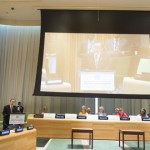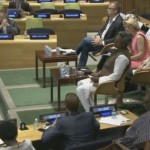In New York on the 70th session of UN General Assembly held on 12th July 2016, it was opened High level thematic debate – Human Rights at the center of the global agenda. Opening the debate, the President of the 70th session of General Assembly of the United Nations, His Excellency Mr. Mogens Lykketoft emphasized that the debate on human rights, which is held for the third time during his term of office, is the main foundation and pillar of everything that the United Nations is based on. He pointed out that human rights are universal, indivisible and mutually interdependent, as well as that all leaders are committed to their confirmation so that all people could enjoy the dignity, freedom and equality. He also pointed out that today human rights in the world are far from universal respect, that intolerance, xenophobia and injustice have become common in many countries, and that the sense of alienation and marginalization have become of the causes of violence and extremism. Within three interactive segments of the debate, opinions of civil society, independent experts and private companies were stated.
The director of the Lawyers’ Committee for Human Rights, Milan Antonijevic, as a part of the Network of Human Rights Houses, in the name of the Human Rights House in Belgrade and the Lawyers’ Committee for Human Rights was invited as one of the participants in the debate. Through the discussion, Milan Antonijevic presented situation of human rights in Serbia as well as work and importance of the Network of Human Rights Houses. He pointed out that analyzing the work of the Government of the Republic of Serbia and generally the work of governments in the region there can be identified three problems within the relationships with civil society. The first problem is the protection of civil society and human rights defenders, i.e. what is the level of protection from violence enjoyed by the state, and that such inactions of the state are characterized in some other countries such as Azerbaijan. The problem that civil society in Serbia and the region faces with is impunity of those who threaten and send such messages. Another problem is the perception of civil society, i.e. how much support the state provides to those who defend human rights. In this regard, Milan pointed out that the direct support of the state is of great importance and that the state should rely on their experience which they have, performing their services, such as legal aid, among other things, provided by Lawyers’ Committee for Human Rights. In Serbia, as in Bosnia and Croatia, civil society was seen as a threat in the 90s, and in the meantime that figure has not significantly changed in the eyes of the authorities. Authority lives in a certain gap, that civil society recognizes as the ones that do not work in the interest of the society itself. The third problem that civil society faces with is the problem of financial support. He stated that the government generally doesn’t support civil society through their work, that they are still not seen as an ally, and although the civil society is included in discussions and it is asked for opinions, civil society still doesn’t feel direct support.
Within the discussion, Milan Antonijevic said that the state repression can be separated from the non-state repression, and that in some countries the government allows to non-state actors, such as the media in Serbia, that often remind civil society on the Russian model, and what can really happen to civil society if some of those laws are adopted. He also indicated that aforementioned media is responsible for creating images that present civil society as unrelated to the society and citizens.
In his speech, Milan said that there are also encouraging examples where civil society performs dialogues with state actors, and that in Serbia there is also a practice of dialogue regarding the adoption of certain laws.
At the end of the discussion, as a conclusion, he especially underlined the problem of countries that don’t have a clear European perspective and European standards, and equally important support and mutual cooperation that civil society in those countries should have. In Belgrade, as well as in the region, there are Human Rights Houses that have been faced with these problems for twenty years, and that direct support to civil society and making space for their work are of great importance for the society.
Milan Antonijevic’s speech in the UN General Assembly held on 12th July 2016 can be viewed on the Youtube channel of the Lawyers’ Committee for Human Rights YUCOM. The entire discussion can be viewed on the web platform of the United Nations.
Transcript of Milan Antonijevic’s speech









